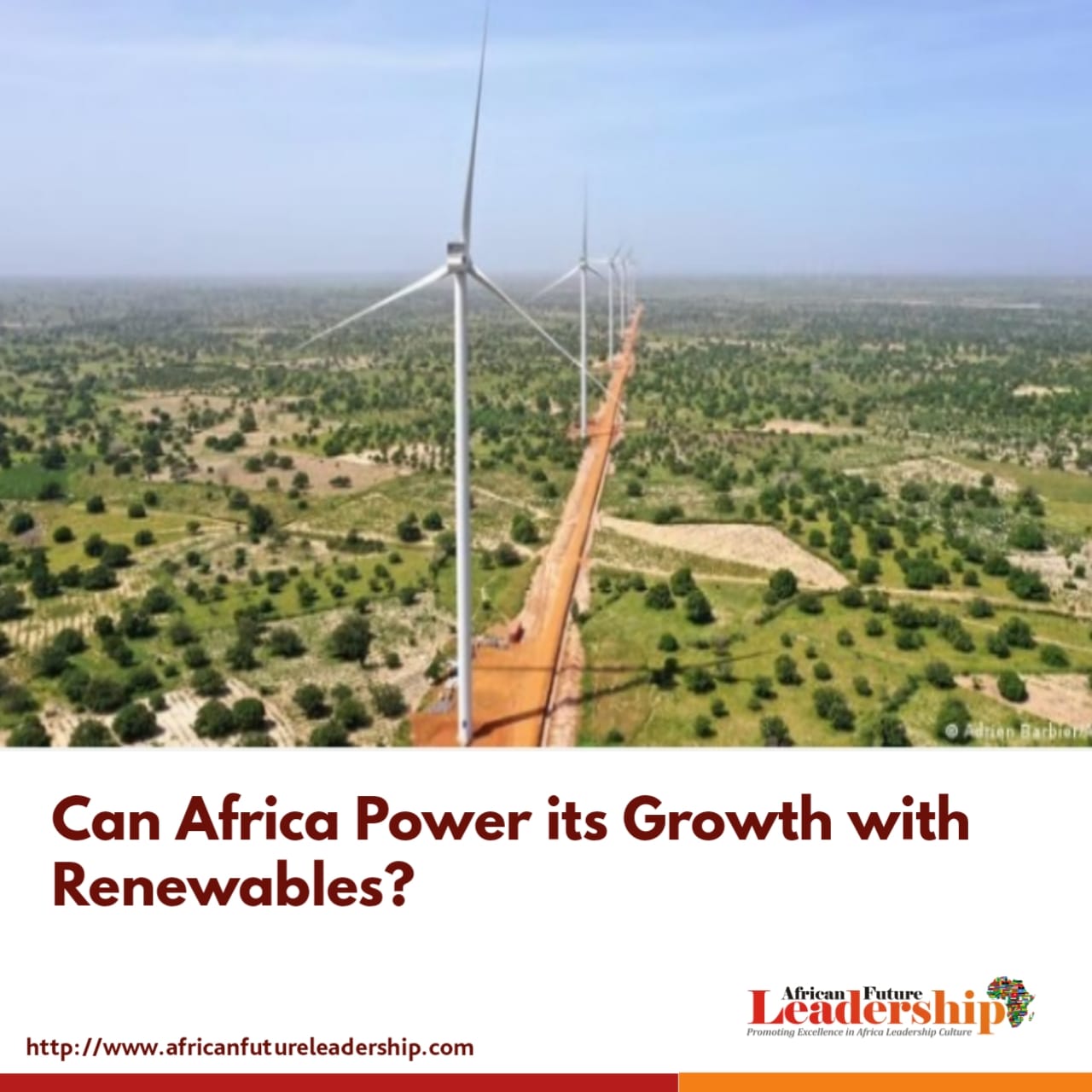There has been a raging debate in the recent time as to whether Africa can actually power its growth with renewable energy sources.
This is mainly because, in sub-Saharan Africa, more than half of the people don’t have access to electricity. But power usage is projected to double by 2040.
Thus, experts are wondering how green energy can replace fossil fuels in this growth spurt.
It is significant to note that Africa has the potential to become a renewable powerhouse.
This is because, with much of it bathed in sunlight year-round, the continent has 60% of the world’s best solar resources. And it has enough wind potential in a year to meet its electricity demand 250 times over, with resources stretching all the way from Algeria to South Africa.
And countries like the Democratic Republic of Congo and Ethiopia already cover more than 80% of their consumption with hydropower — but there is room to produce even more across the continent. Meanwhile, Kenya is a world leader in harnessing geothermal energy.
Be that as it may, though the use of clean power varies greatly across Africa, the continent as a whole still gets almost all of its energy from fossil fuels. As half of the population in sub-Saharan Africa doesn’t have access to electricity, there are hundreds of millions of customers waiting to enter the market.
It is worthy of mention that other continents that are electrified off the back of coal, oil, and gas and, to different extents, are now trying to transition to renewables. So, could Africa skip fossil fuels and service new consumers with green energy?
READ MORE: Africa Renewable Energy Investment at 11-year Low, says research statement
Africa is said to have precisely 60% of the world’s best solar resources.
Hence, cleaner, cheaper, more flexible alternative renewable energy is quite possible.
Again, “What makes Africa the right continent to roll out those [green] technologies is the simple fact that they are there in abundance,” said Tony Tiyou, CEO of the engineering consultancy Renewables in Africa that works in Kenya, Mozambique, Ghana, Nigeria and Benin. “I call it the promised land.”
Therefore, for people living in Africa, leapfrogging to clean power has one very clear benefit: Mitigating the climate crisis, because they have felt the effects of burning fossil fuels first-hand. This process releases greenhouse gases that heat the atmosphere, which makes extreme weather events more likely and more severe.
Also, it was further stated that the continent has recently seen crippling droughts in East Africa that displaced thousands and threatened food security. There were floods and landslides that killed hundreds in South Africa in April, and tropical storms that devastated Madagascar, Mozambique and Malawi earlier this year.
Pointedly, Kenya is said to be a leading producer of geothermal energy;
And historically, Africans have not been at fault for the climate crisis. In 2021, they were responsible for less than 4% of global emissions. But their carbon emissions are growing quickly, and environmentalists say that diversifying Africa’s energy mix is vital to stopping the continent from becoming part of the problem later.
As Tiyou, put it, “It’s not just about how much you generate in terms of emissions. It is also about what kind of consequences you’re facing.” “Do you want to repeat the same mistake other people have made?”
The good news, for a possible transition, continued Tiyou, is that the cost of renewable technologies has plummeted in recent years, putting them in the same range as fossil fuels. In 2020, solar projects in Zambia, Senegal and Ethiopia were auctioned off for as low as $25 per megawatt hour, according to the International Renewable Energy Agency. That makes them more cost-effective than fossil fuels.
It was confirmed that renewables also provide flexibility in a region where electricity grids often don’t reach rural populations — and if they do, they are expensive. The solution: Rooftop solar panels or mini-grids that can work independently and provide enough to power lights and a phone charger.
The point was made that, though the energy mix varies greatly across Africa, the continent as a whole is still very dependent on fossil fuels.
Not enough money or political will
It was further opined that, there are numerous obstacles hindering the growth of green technologies in Africa.
It was said that, in the last two decades, just 2% of global investments into green energy were made across the continent.
This is such that “Companies that are trying to invest in renewable energy are looking at a market in Uganda for people who are poor. So there is no big interest,” said Dickens Kamugisha of the Africa Institute for Energy Governance – The Ugandan non-profit fights environmentally damaging projects. “But the oil is produced by huge companies that can attract funding from all over the world.”
It was again stated that, when diversifying the energy mix, there are also issues around the costs of importing equipment from abroad. And though many countries have made steep learning curves with solar, this technology still makes up less than 1% of total energy production and needs to be expanded for the expertise to grow more.
However, experts say one of the greatest obstacles to tackle is a lack of political will. So, where foreign commentators see the risk of ever-growing pollution, many African politicians see the opportunity to develop the same way that all other continents did. They say their countries’ emissions will always be a long way from those of the US, China and European nations.
This is to the extent that, “Africa has woken up and we are going to exploit our natural resources,” Uganda’s Energy Minister, Ruth Nankabirwa Ssentamu, said last month.
Again experts say Africa could be locked into a carbon-intensive future.
There is also disclosure that ateam of researchers from Oxford University built a machine learning model which found that the continent is unlikely to ween itself off fossil fuels this decade.
And looking at projects currently in the pipeline, their 2021 study found that two thirds of power is likely to come from fossil fuels by 2030. About 18% should come from hydro projects and less than 10% from other renewables.
In this case, “The development community and African decision makers need to act quickly if the continent wants to avoid being locked into a carbon-intense energy future,” study author Philipp Trotter said in a press release.
Instructively, the study emphasizes that countries actively need to cancel planned fossil fuel plants. For activists like Kamugisha, this is the only way to protect the rural communities who are hardest hit by the climate crisis and disconnected from volatile fossil-fueled grids.
He stressed that, “If we borrow money to invest in oil, it means the country will have no money to invest in other sources like renewable energy.” “And the biggest loser will be the poor person who lives in a village.”




